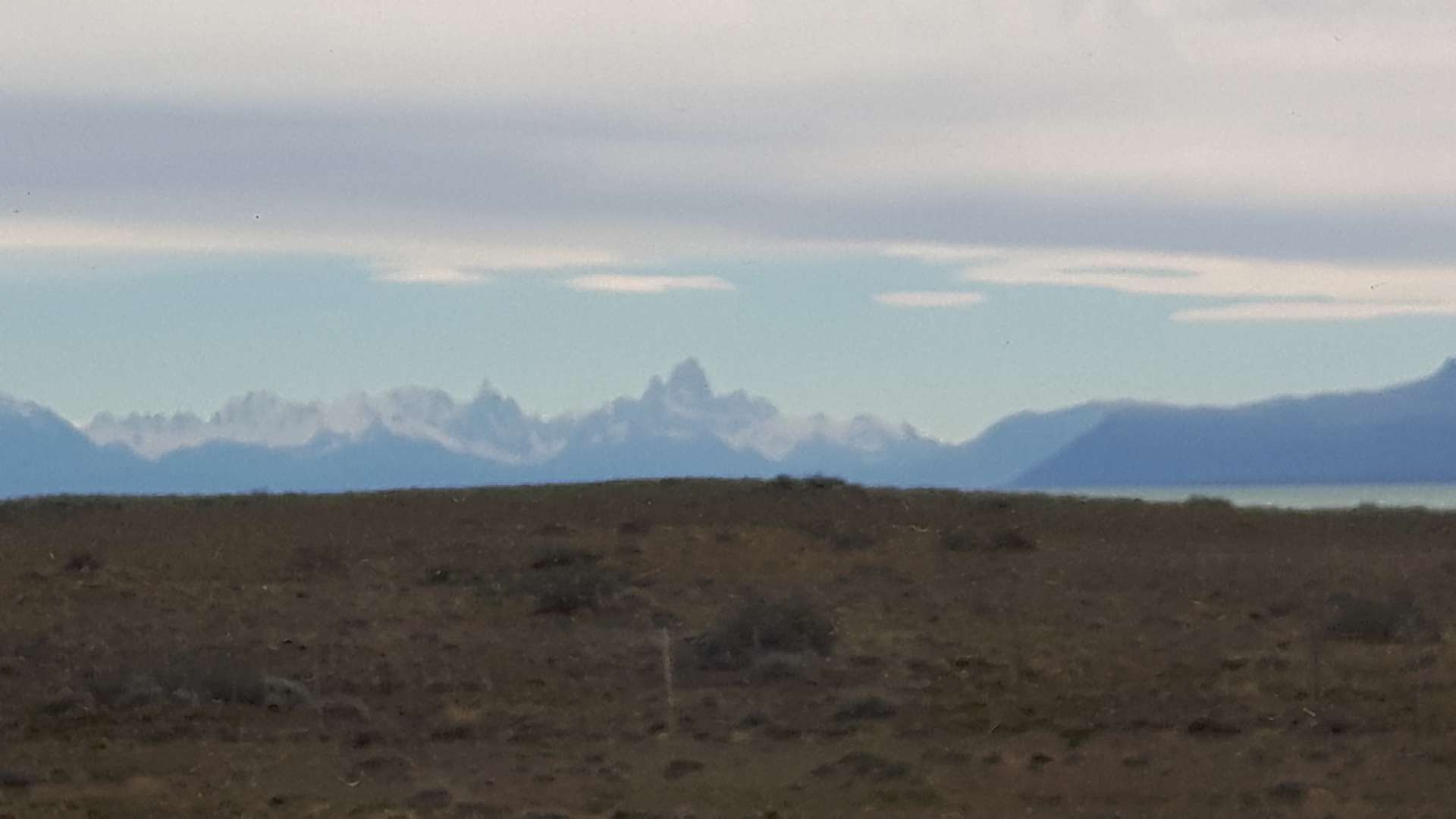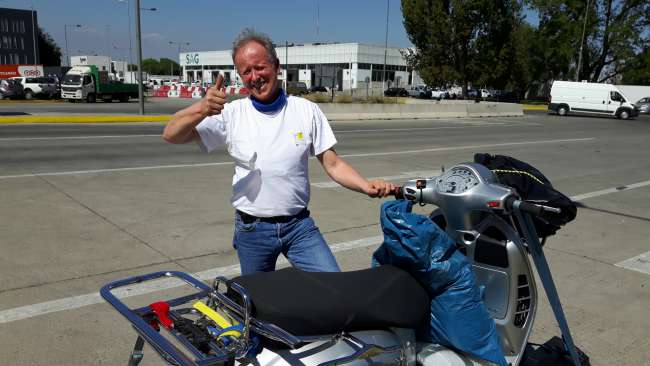15.10.: Distrito las Pambas - 2,975 m -
Chop etilgan: 17.10.2017
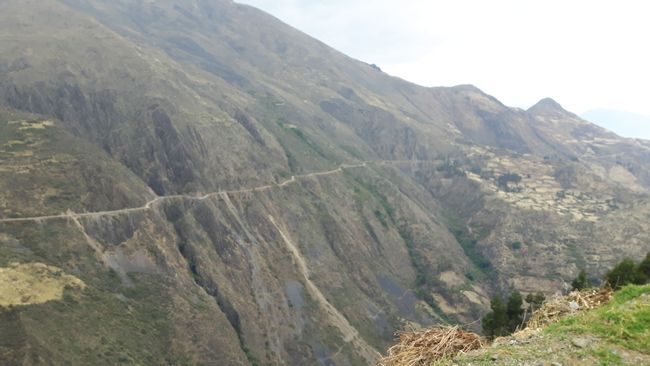
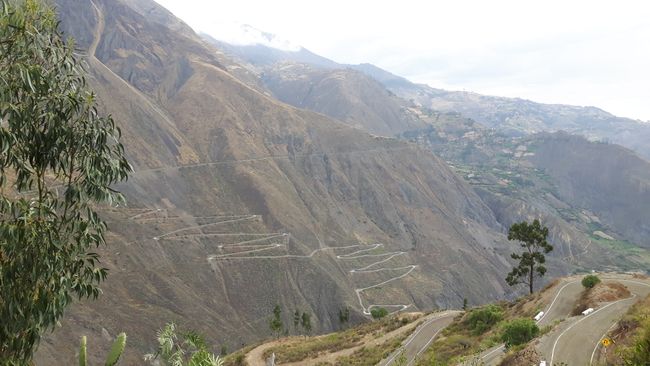
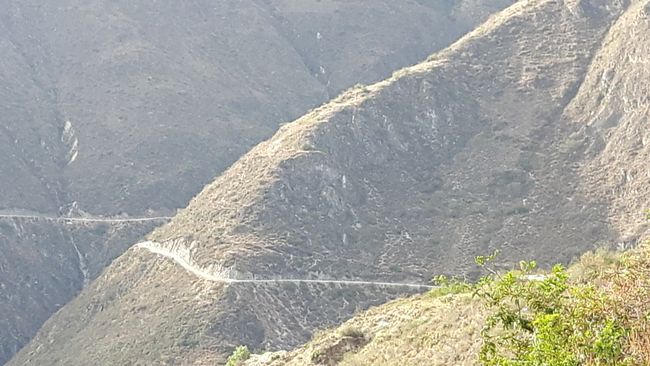
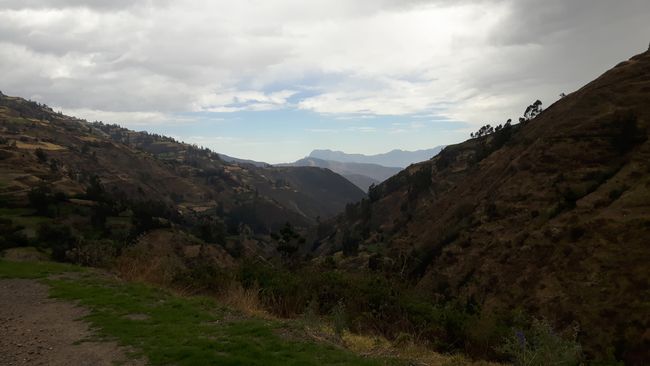
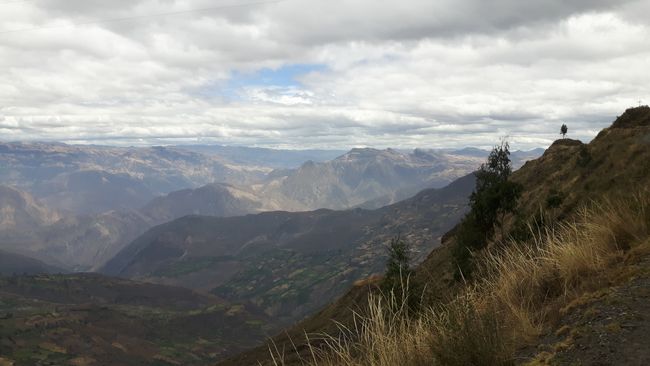
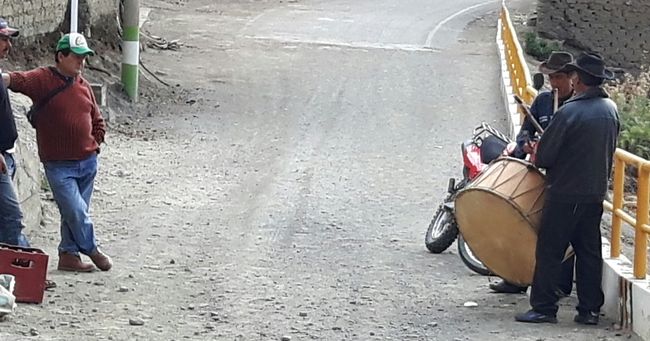
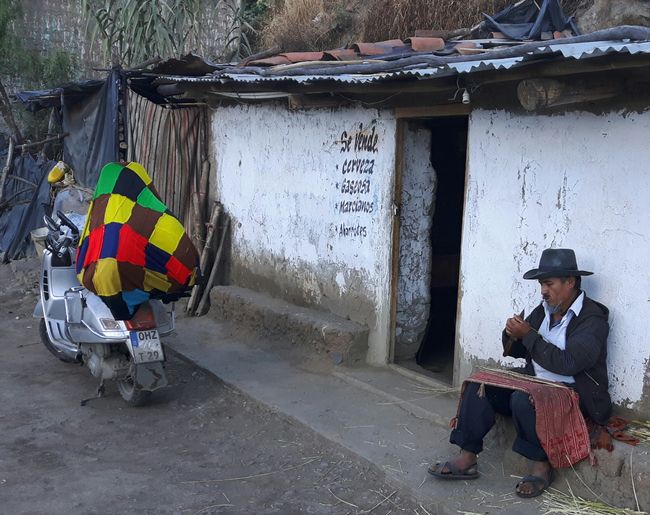
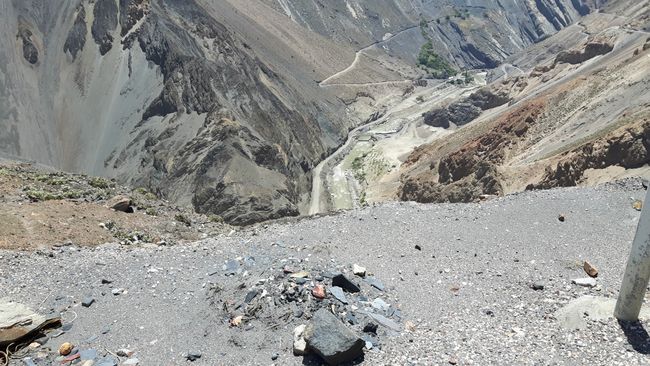
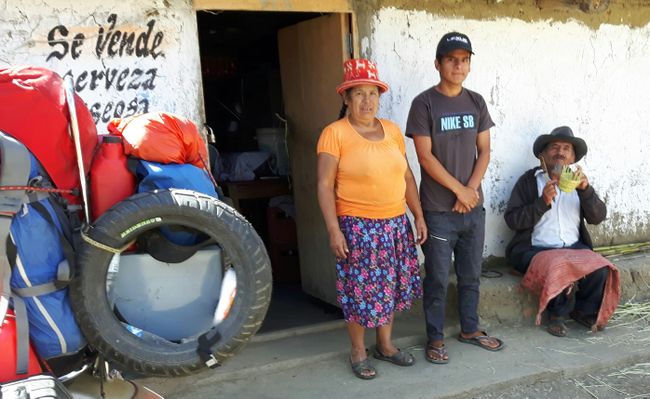
Axborot byulleteniga obuna bo'ling
15.10.
In the evening before, I had rice with chicken schnitzel, crispy fried, and a salad. Double portion. Exactly as I wanted. The polished clay floor was so smooth that it almost resembled the bathroom of the Inca in Cajamarca. Yes, there was also breakfast - starting at 6:30. Perfect.
The night in my healthy sleeping chamber was quiet. While I was still writing, there was an outdoor service on the plaza. The church was right next to it, but it was closed. However, it could still ring the bells. Or rather, it was a very rapid succession of bell sounds that were not necessarily beautiful.
It seemed to be a non-denominational event on the plaza. The speaker started with a very peculiar singing, and the congregation joined in. Unfortunately, I don't know if he had a great response. Then his speech began, which escalated to the point where his voice became hoarse. I don't know if it was naturally like that or if he used it as a stylistic device. I suspect the latter. Towards the end of his one and a half hour speech, the cries of hallelujah multiplied, repeated by the congregation. In my opinion, it was very exaggerated, very hypocritical, but also very indoctrinating. It strongly resembled the Nazis in terms of style and manner.
A sociologist should study the role of the church in Peru and write a thesis on it. It plays a big role here, although I don't know if the non-denominational churches prevail. But it certainly provides comfort - from my spoiled German perspective - for the hard and deprived life. On the other hand, the campesino doesn't know anything different. So what role does this church play here? On cars and trucks - from the beer wagon to the container transporter - there is a long stretched privacy screen made of film, printed with messages like: read the Bible or God is with you, God helps you, God loves you, etc. On the trucks that have large rear doors, there is a painting of Jesus with a halo and a sunset in the background, looking at the following traffic and proclaiming his words. It's somewhat grotesque, when sacred messages are spread on beer or garbage trucks.
Hygiene is not a priority this morning. Brushing teeth is just about manageable, everything else is left aside. Privacy is not important in the countryside. There is no door. Neither to the anteroom, nor to the shower. I have the impression that the village also uses this toilet. There is no toilet paper available, everyone has to provide for themselves.
The breakfast I receive is very delicious. A tortilla with tomatoes, onions, and peppers. And a coffee with milk. The milk has the disadvantage that it stood for a few seconds too long and has formed a skin when served. There is almost nothing worse than a skin on the milk.
The Vepse is parked in the driveway, which is slightly sloping. So I have to remove almost all the attachments and push it back with my own strength. Then there is just a small step and I'm at the end of my strength. I juggle back and forth, but then a attentive thirty-something passes by and helps me out of the driveway. The plaza is already quite populated. The three-wheeled motorcycles are ready to take the villagers to the field. Large sacks with the harvest are loaded - there is a lot to do. Women in their traditional costumes sit in the morning sun on the sidewalk and sell fruits, sweets, etc.
The younger generation sits on the benches, testing the internet reception. Going to church or hearing the 'bell tolling' is out of the question.
Unpacking my Vepse is like a little sensation, not openly followed, but observed from the corner of the eye.
As a gringo, I am always under observation. Especially in the village. But also in the city and in restaurants, when I order or want to pay. Conversations die down, heads turn, while I try to explain to the waiter that I want orange juice or a lot of salad.
Before I start, I stop by the police station to inquire about the route and its condition. Half an hour ago, the office door was wide open. All the documents were accessible, A4 format books that remind me of class registers, the monitor was turned on and I'm still wondering how the police can maintain contact with the outside world. Radio? In the mountains?
I ask a passerby about the policeman. He's having breakfast next door.
When I come back now, there are three policemen here. One is sitting at the computer, the others are just standing around. I'm greeted nicely and I explain my intent.
But before I can start, I am asked where I stayed overnight. I point to the house. Hopefully, my landlady has registered everything properly. Then a young woman walks across the plaza, which also attracts comments. More professionally oriented, asking where she is from, where she is going, what she is planning. All of this sounds like control to me. I discreetly look aside. A small village with great control potential.
If I am not allowed to finish because someone thinks they know my thoughts, I become energetic. But when it happens in a foreign language and I have to carefully put my words together to reach the end of the sentence - and then comes the interruption, I change my tone and the other person knows that I am not done yet. Just like here, and it works. I receive the reassuring answer that the road quality will improve later. But for now, it's just a dirt road and later it becomes paved. Then I want to know how to leave the plaza with as little slope as possible. Apparently, there are several options, each of which is declaimed by the standing police officers. In the end, I don't understand anything and signal that, and then I am accompanied out of the village by a police pick-up.
The pick-up is driving slowly in front of me - unfortunately without a siren - and emits black smoke from its exhaust. I can already see the respectable, probably 30-meter-long slope approaching us, but it doesn't affect the driving behavior of the policeman. He is chugging his way up the steep road in front of me, and I stay on one-third of the road standing.
It's still early, I'm well-rested, I turn around, drive all the way back to the plaza, and then quickly go down the steep road and up the slope at full speed. Luckily, no children run onto the road. The policeman is already waiting impatiently at his driver's door when I come to a stop with speed. He then tells me about the following towns, says goodbye, and off we go.
Compared to yesterday, it's easier to drive today. "Plano" is the word that comes to mind. And it really is like that. I can drive faster and enjoy the landscape more again. The hairpin turns, which I always have respect for because they can challenge the Vepse, on the one hand, because they can struggle with them, and on the other hand, because I use the left lane to get up at all. I drive through the villages that my navigation system shows me and that the police officers named. How far will I make it today? I left early, but what surprises await me?
The route doesn't stay at one elevation, it climbs up the mountains and goes down into the valley. That's how it has been for days. It gets particularly exciting in the valley. Is there a bridge over the rapidly flowing stream? And if there is one, is it passable enough for me or are there wide gaps between the surface where the Vepse's 12-inch wheels make crossing a risky endeavor? Or do I have to go through the stream unprotected? Usually, it always works - but today I have to fight my way through a rocky flow with the Vepse. Slowing down now would be nonsense. Full speed ahead! However, the stones underneath are slippery and the Vepse loses its track, forcing me to stop or even tip over. But I'd rather have the Vepse under control than being thrown off here. And here I am. Boots in the stream and moving forward and backward is quite difficult, especially since I am handicapped by the backpack that I always wear on my chest. My attempts to free myself are accompanied by curses, but they are drowned out by the sound of the rushing water. I throw the backpack onto a dry spot and try to free the Vepse from the grip of the rocks. Finally, it works, I accelerate and take the rest with momentum to get back on concrete. The gravel roads are not nearly as bad as the days before. But now the paths - you can't call them roads anymore - are getting narrower. I have a long descent ahead of me and get closer to the mountain. Now the cliff is only a few centimeters away from me. It also has the characteristic of throwing off rocks and rubble. This makes driving uncertain, on the one hand because I could slip away, on the other hand because at that moment a load of rocks could fall in front of me or down on me. I don't know when it started, but the announcement of the police is coming true. The asphalt replaces the gravel!

The tight curves add to the fact that I'm glad that we're finally going uphill again.
I cross a narrow bridge, and then it goes uphill. Luckily, here the zigzag serpentines are lined with additional concrete slabs to reduce the steep ascent in the inner curves. The Vepse appreciates it, before every curve, I honk because I don't want to be pushed away by my crazy pickup driver. If I were sitting in a tour bus on this road and had a window seat on the right side - it would be quite a challenge to my nerves. I have an amazing view, but I don't let myself be seduced. The road would be closed in our country. It slopes down to the right at some points and there are little yellow flags indicating this danger - but what if it's dark? The trucks drive day and night.

Back to a gravel road or rather a gravel path with rocks and very narrow. It's not far to Las Pambas.
I'm sitting here and can even receive and answer emails and WhatsApp messages. When I get up, there is - exaggeratedly speaking - an avalanche of stones. Very crumbly material up here...
A mandarin break is due again with a great view. Finally, I can take pictures again. And what makes me particularly happy, but also surprised, is that there is no traffic on this road. Only one pickup and later a smaller truck pass by me.

The decision-makers of this world should leave their cushy offices once a year and pause at places like this. Their power game would be more difficult.
I'm sitting here for a long time and enjoying the absolute silence. Occasionally, a bird chirps, in the distance, there are donkeys and sheep, but otherwise, there is nothing. Then comes drum and flute music from the opposite side and an airplane is flying towards Lima in the sky. Tranquility is a valuable and scarce good. It usually doesn't last long.
As a beautiful finale, there is a race with two dogs that have impressive stamina. They race after me and have enough breath to bark. I don't take them seriously because I know that normally they lose interest after a few meters, but these ones stay on. The barking stops and I think they give up, but no. In my rearview mirror, which has a view of the luggage, I see both of them sprinting behind me with their ears folded. And just now I have to slow down because another curve with gravel is coming up. I'm wearing sturdy hiking boots and am ready to kick. I slow down, they are at my level. The curve is done - I gain speed again. Then they give up.
Las Pambas, which is not allowed to be called a "village" but has the official designation of "distrito" and therefore may have just under 1,000 inhabitants, is in a picturesque spot on the slope. From a distance, it catches the eye with its green and white painted stairs leading up the slope.
When I drive into the "village," I see the drummers. Judging by the volume, I expected a brass band. It's two Peruvians, each with a type of flute and a large drum.

I am immediately asked if I want to have a beer with them. I would love to after this ride, but I still need a place to sleep. I take the opportunity to ask if there is a hostel or a hotel nearby - the looks are followed by the answer "no hay" (there isn't).
I drive to the plaza mayor (main square) expecting to meet people. But there is no one here! Very unusual for a plaza. I drive a bit out of the village, it goes steeply uphill, and there is a peasant woman sitting there with her little dog, silently looking at the landscape.
I turn around again and see a few people sitting in the distance. I drive towards them and am greeted nicely, followed by a request to join them. I tell my story and then ask about a "cuarto" (room). The three of them look at each other, an idea flickers, explanations of how I could get a room here fail to convince me, and the youngest of the three goes on her way and signals me to wait here.
A short time later, she calls from below and tells me she has something and I should come.
She is in front of a grocery store, which only becomes recognizable as such when you stand in front of it and read the words painted in beautiful handwriting with black paint. Beer, bread, fruits, etc. It is a typical adobe house with a small extension and a plot behind the house on the slope. The house owner joins me and shows me my room. We go up to the plot. There are chickens and geese, further up there are two doors in a remaining adobe wall without a roof, to the left of them, there is still the roof and the walls, and the door is closed. That's where we go. He shows me my sleeping place. It's dark and it takes me a while to get used to the darkness, but I have long since agreed. The mattress is somewhere on the floor, but the bed frame seems to be in order. There is no light. No problem! As long as I have a place to sleep and don't have to keep driving. The sun is already quite low.
The deal is made. 12 soles for the night. I can also get something to eat here - there is no restaurant or anything similar. Tonight at 9:00 pm, there will be music on the plaza. I thank the lady who arranged the sleeping place for me. My landlady has gone back into the house to prepare something for me to eat, the landlord and I are still outside, talking and silent.

The landlord sits on the bench, bamboo stalks next to him, which he peels, splits, and makes baskets out of.
My sleeping place is behind the curtain, and my hosts have thoughtfully covered the spare tires with a blanket.
He has two sons. One is in Lima and the other is still at home. The food is ready, and I am called inside. It's a room of about 30m2, divided into sections. The kitchen is on the right. Stripped guinea pigs hang from the ceiling, and in the sales area, where I am supposed to sit at the table, the food is served. There are no windows, light only comes through the open door. The adobe bricks are wallpapered with calendar sheets. The clay floor is packed and also serves as a way to dump the remainders from the cups. There are noodles, rice, potatoes, and a piece of chicken. Plus a tea made from freshly picked leaves. The landlord sits outside on his bench. Every now and then, farmers pass by, curiously asking him if he is now riding a motorcycle... He tells the story of the gringo. The landlady is busy in the kitchen. She has preparations to make for the next day. She has invited many friends. They will have guinea pigs.
While I eat, the two of them make a decision. After dinner, I stand outside, enjoying the view into the valley and smoking, while the two of them are busy in the annexe. I already suspect that they want to make room for the Vepse, but then the landlord comes over to me and offers me the just swept and tidied room as a sleeping place. Here, there is also light. I see the tightly packed clay floor, a fireplace, plastic tarps on the front wall, but no bed frame. I have a sleeping bag and a sleeping pad, so I am flexible. I agree and pack my things from the Vepse into the small room. Meanwhile, the two of them build my bed. The mattress from the upper plot is brought down, and old cardboard boxes are unfolded to prevent the cold from underneath. Then they find a blanket to put underneath, and the sleeping place is ready. There is no door, but a thick curtain.
It's dark, I have my belongings under cover and ask the landlord if we want to have a beer together. We go to the kitchen. He takes a one-liter bottle from the beer crate, carefully dusts it off, and puts it on the table. The television of older vintage shows a cooking show. This is the only channel. The picture is swimming, but you can still make out enough.
I tell him about my journey, about my kids, he tells me about his son, and then we fall silent and examine each other to see who cooks the better meal. The landlady can only be heard, but not seen. A solitary energy-saving lamp is hanging from the ceiling.
I ask about the bathrooms. I expect a gesture towards the garden or behind the house. No. The landlord gets up, and we leave the house. We walk about 20 meters down the road until we come to a small house that houses two toilets and a shower. He discreetly retires to his house. The women's toilet has a door. For the men's toilet, there is no door, and the shower room can be closed with a quarter door that just about conceals the nakedness of the person showering. There is no washbasin.
I decide to forgo the music and go to bed early. I say goodbye to both of them, and my nightly adventure begins. The lamp can only be switched on from the kitchen, so I find the sleeping bag in the dark. The floor slopes towards the valley. I stretch out, and just before falling asleep, I hear a timid clucking, then wings flapping, several clucks, then silence again. Only rustling remains, which could come from mice or rats. So far, I haven't thought about the room layout. Where are the chickens? Do they have to spend the night outside because I took their place? They must be very close to me, but where? Are they perhaps housed in this room and proudly strutting around on my sleeping bag? I hear scraping that can only come from the beaks, which are working on a wooden board. Imagination knows no bounds. Then the music starts on the plaza, which lasts for a long time. Sleep is impossible now. Or so it seems - because I was awakened by a pitiful meowing. But I can't locate it. It's pitch black, there's nothing to see. I don't even see cat's eyes. But it seems that she is not far from me. My phone's battery is dead, so I don't have a flashlight. Somehow, I manage to get through the night.
Axborot byulleteniga obuna bo'ling
Javob
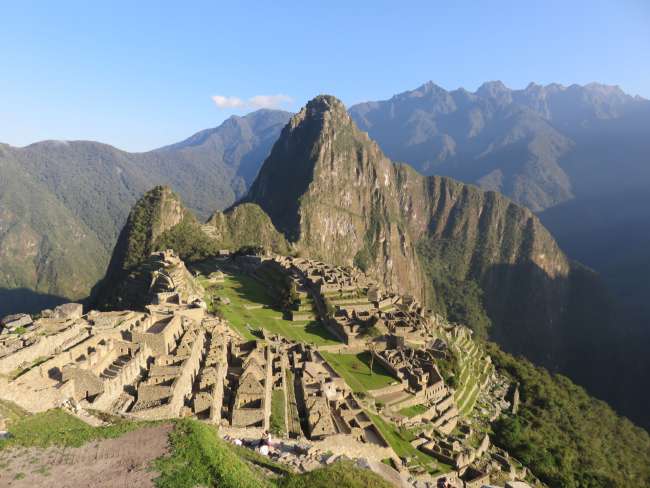
Sayohat hisobotlari Peru
